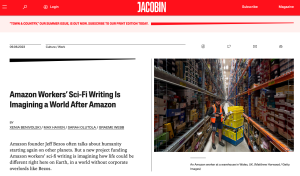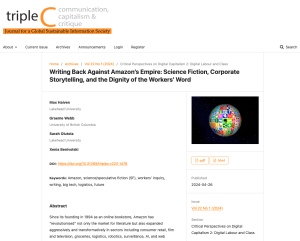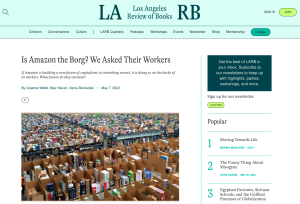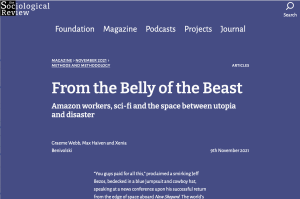The World After Amazon
A project to support workers to reclaim the power of future-making
In 2023, the Worker as Futurist Project supported 13 rank-and-file Amazon workers to write short, speculative fiction about The World After Amazon. The result is the book featured on this website.
Since it was founded in 1994, Amazon has presented itself as a benevolent force in our world, “revolutionizing” many areas of life and the economy, from books and media to robotics and logistics, from groceries and electronics to internet services and much, much more.
The corporation promises to bring us a utopian future of consumer convenience. But its workers pay the price, often toiling in dystopian conditions to generate profit so great their boss was able to finance his own private space program.
Companies like Amazon are indeed shaping the future of humanity, but the workers who generate its wealth have no say in that future.
The Worker as Futurist Project aims to support workers to tell their own stories, dream their own dreams, and reclaim the collective power to shape the future, in solidarity with the workers and communities around the world that are rising up to challenge Amazon.

Milton Friedman knew the future was up for grabs, and that in crisis, 'ideas lying around' moved from the periphery to center in an eyeblink. Two can play that game: imagining a better future is a way to seize that future, and sadly, we are in for innumerable crises where our 'ideas lying around' can come to the fore.

These wonderfully various and surprising stories prove that, if we don’t manage to find our way beyond Amazon, it won’t be for lack of political imagination. In this volume, the labor conditions of the present give us a unique vantage point on possible futures.

These stories written by Amazon workers shows us how hope remains—not in attempts to revive grand narratives of the high-tech future, but in acts of everyday solidarity and alternative possibility that sustain those caught up in Amazon’s world-machine. An essential book for anyone seeking to understand how imagination operates as a political force today.

Worker writing can play a key role in organizing, both reporting on conditions and circulating examples of struggles. This excellent collection of worker's short stories demonstrates the continued importance of worker writing today. Each story offers important insights into the potential futures of work - and the creative ways for how we can get there.
Stories from Rank-and-File Amazon Workers
In Ibrahim Alsahary’s “The Iron Uprising,” robots and humans come together in common struggle… and in love. Cory Gluck’s “Thalia in Albios” depicts one woman’s journey through a dystopian future, from terrified housecleaner to fearless revolutionary. What could go wrong if scientists tried to artificially enhance the empathy that people have lost in an age of techno-isolation? In Dartagnan’s “Relentless” we find out.
In Anneth Chepkoech’s “Life After Amazon” a young migrant boy dreams of creating an online retail platform that respects and values workers like his father. Pearl Cecil Sigur Ramsey’s “ANYBODY HOME?” presents a podcast from the end of the world, where corporations can even exploit screams of rebellion.
Several writers chose to remain anonymous. “Forever on the Clock” tells the story of a worker who quits Amazon only to discover the prison where he is being held looks very familiar… In “The Dark Side of Convenience” workers are kept so busy working for Amazon they don’t realize the apocalypse the company is helping to create. After Amazon’s fall, a local ruler uses violence and fear to dominate the island of Zanjara. It’s up to his son to find “The Museum of Prime” and restore the balance.“New Entry” takes us to the far future, where humanity has found the source of infinite energy, but is not yet free from the power of propaganda…
These nine stories are accompanied by an introduction to the project and essays by the coordinating team. Max Haiven writes of the figure of the alien and workers’ experiences of alienation.Sarah Olutola meditates with W.E.B. Dubois on the power of words to change the world. Graeme Webb reframes speculative writing as a form of play that opens the radical imagination. And Xenia Benivolski reflects on how, in both Communist and Capitalist societies, speculative fiction gives rise to subversive dreams.
Do you need a review copy?
We are happy to provide free paper review copies to journalists, reviewers, organizers and other interested parties. Please email Xenia at xbenivol at lakeheadu dot ca with your name, the publication/organization you work for and your mailing address.
Here, you can read the workers’ stories online, or download the book as PDF or an ebook, all for free. Or you can order a print copy of the book to anywhere in the world.
Listen to the stories here on the website, as a podcast (search for The World After Amazon in your podcast app) or as a free audiobook.
You can also learn more about the project below.

READ
- Read as a PDF
- Read as an EPUB
- Order a book
- Or click on the links below
STORIES
REFLECTIONS

LISTEN
Stories
Or search for “The World After Amazon” in your podcast app.
Interviews
In 2023, the team behind The World After Amazon released a 13-episode podcast of interviews with experts on Amazon, activists and organizers, science fiction writers and others dedicated to reclaiming the future from corporate control.
Read more about The Workers’ Speculative Society.
To listen in your podcast app, earch for “RiVAL Radio” or use this link.
NEWS
Events
October 21, “Amazon and the Alien: Corporate Storytelling and Workers’ Science Fiction” at Princeton
More information soon.
Past

INFO
Writing and Interviews
Team
- Xenia Benivolski, a curator writer, and lecture focusing on sound, music, and visual art. Her writing appears in art publications and academic journals such as e-flux journal, Artforum, Art-Agenda, Infrasonic, and Flash Art.
- Max Haiven is a writer and teacher and Canada Research Chair in the Radical Imagination. His most recent books are Palm Oil: The Grease of Empire (2022), Revenge Capitalism: The Ghosts of Empire, the Demons of Capital, and the Settling of Unpayable Debts (2020) and Art after Money, Money after Art: Creative Strategies Against Financialization (2018). Haiven is editor of VAGABONDS, a series of short, radical books from Pluto Press. He teaches at Lakehead University, where he directs the ReImagining Value Action Lab (RiVAL).
- Stella Lawson was an MA student in Lakehead University’s Social Justice Studies program and lives in Montreal.
- Dr. Sarah Olutola, is Assistant Professor of Writing at Lakehead University, researching children’s literature, youth culture, representations of race in popular media culture, postcolonialism and global capitalism.
- Dr. Graeme Webb is an instructor in the School of Engineering at the University of British Columbia. He recently completed his dissertation, Science Fiction(ing): The Imagination, Crisis, and Hope (2020), which focuses on discourses of technology and social change.
- Illustrations by Amanda Priebe.
Contact
- Xenia Benivolski – xbenivol at lakeheadu dot ca
- Max Haiven – mhaiven at lakeheadu dot ca
Support

RiVAL
The ReImagining Value Action Lab

This project is supported in part by funding from the Social Sciences and Humanities Research Council of Canada













